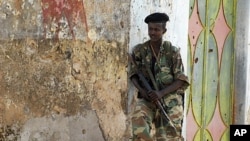Somalia's transitional federal government has announced that al-Shabab militants have retreated from Mogadishu, leaving the African Union-backed government in control of the capital.
Somali officials said successful military operations this week by government and African Union forces drove the al-Qaida-linked militant group out of the capital city.
“The government forces and AMISOM together they fought very strong and every encounter they defeated Shabab and that's why retreat, retreat, retreat at the end. So, I think three months ago it started - the beginning of the end of Shabab,” said Mogadishu Mayor Mohamed Ahmed Noor.
Noor adds that government forces will continue to pursue militants in other parts of Somalia.
An al-Shabab spokesman said the group began leaving its positions in Mogadishu late Friday but he called it a strategic move and said al-Shabab was holding its positions outside the capital.
Al-Shabab has been fighting to overthrow Somalia's government for the past several years and controls large areas of Somalia, including those that are worst-affected by drought and famine.
Somali Prime Minister Abidweli Mohamed Ali said in a statement Saturday that the al-Shabab insurgency is a “fundamental cause of the famine.”
The group has tightly controlled the delivery of aid to famine victims and has banned access for many Western aid agencies altogether.
The government has said the group also posed a threat to internally displaced people who had fled to Mogadishu.
But Mayor Noor says the removal of al-Shabab does not eliminate the risk to IDPs.
“It was not Shabab that was causing trouble within the IDPs: it was an enemy within here, so we have to deal with them more than we are dealing with Shabab,” he said.
Noor says that even with al-Shabab out of the picture, refugees in Mogadishu are still threatened by other militias, warlords seeking political power and war profiteers who scam vulnerable civilians.
The United Nations declared last week that famine exists among the internally displaced populations of Mogadishu and the Afgoye corridor to the west of the capital.
Overall, the U.N. says five districts of Somalia are in famine and more than three million people are in need of immediate live-saving assistance.
Al-Shabab Militants Retreat from Mogadishu




